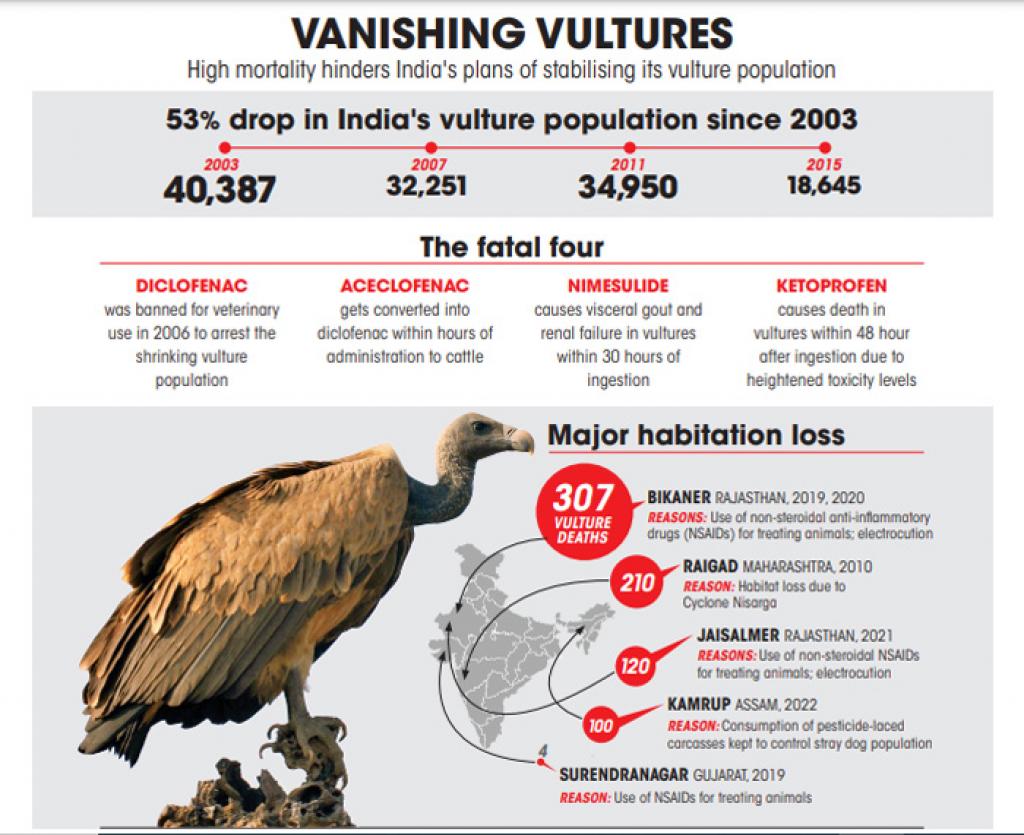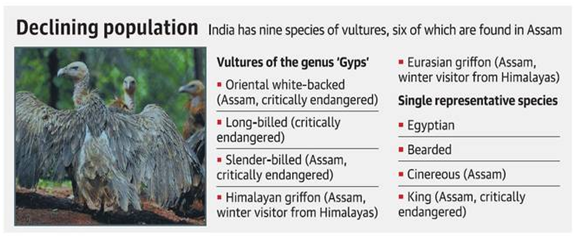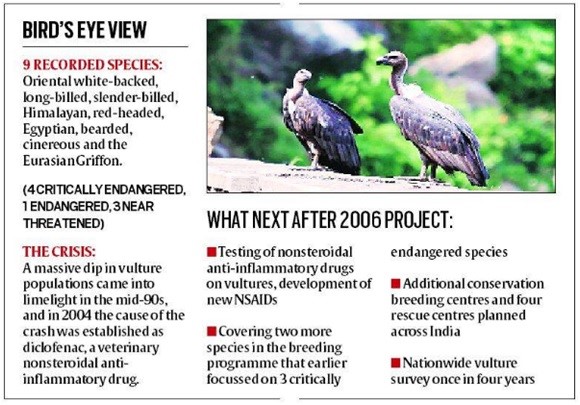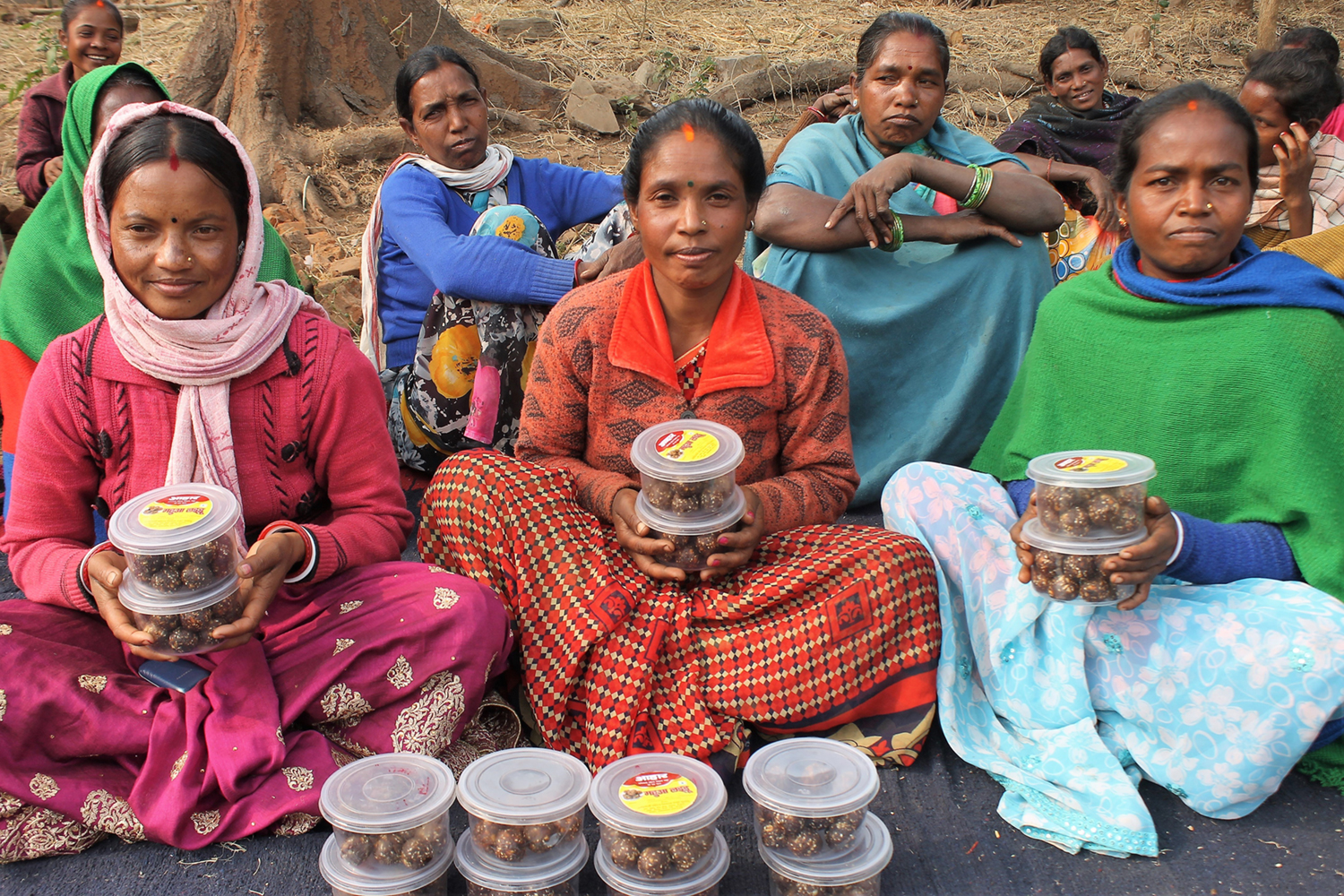Description

Copyright infringement is not intended
Context: The Drugs Control Department of Tamil Nadu filed charges against 104 suppliers, distributors, manufacturers and retailers of Diclofenac in the state.
NSAIDS as a major threat to vultures in India
- The rampant use of the three non-steroidal anti-inflammatory drugs (NSAIDS) threatens to undo the Centre’s two decades of work to arrest the dwindling vulture population in the wild.
- The three drugs—aeclofenac, ketoprofen and nimesulide—were introduced as alternatives to diclofenac, that India banned in 2006 for animal use because it caused widespread vulture deaths.
- The country’s vulture population crashed from over 40,000 in 2003 to 18,645 in 2015, as per the last vulture census conducted by intergovernmental body Bird Life International.
- India’s vulture conservation action plan for 2020-25recommends a ban on the veterinary use of the three drugs.
- India is also a signatory to the Convention on Migratory Species’ Multi-species Action Plan to Conserve African-Eurasian Vultures,which recognises NSAIDS as a major threat to vultures in India.
- The vulture action plan recommends meloxicam over diclofenac. Tolfenamic acidis the other safe option.
Diclofenac
- Diclofenac, a drug used to treat cattle, was linked to kidney failure in vulturesand a decline in the bird’s population.
- Though the drug was banned in 2006, it is reportedly still available for use.
- Diclofenac, that is potentially toxic to vultures being used by vets for treating cattle. The drugs make their way into the vulture’s system as they feed on carcasses.
- Three of India’s vulture species of the genus ‘Gyps’— the long-billed (Gyps indicus) and the slender-billed (G. tenuirostris) had declined by 97%, while in the white-rumped (G. bengalensis) declined nearly 99% between 1992 and 2007.
‘Action Plan for Vulture Conservation 2020-2025’
- It proposes to establish Vulture Conservation Breeding Centers in Uttar Pradesh, Tripura, Maharashtra, Karnataka and Tamil Nadu.
- There would also be a conservation breeding programme for the Red Headed vulture and Egyptian vulture, and at least one “Vulture Safe Zone” in every State for the conservation of the remnant populations.
- There would be four rescue centers in different geographical areas:
- Pinjore in north India,
- Bhopal in central India,
- Guwahati in northeast India and
- Hyderabad in south India,
- as well as regular surveys to track population numbers, the plan envisages.
Why vultures are important to protect nature?
- Vultures, as carcass feeders, hold the key for a natural mechanism of infection control.
- Vultures are the scavengers who do the work of cleaning up, and keeping the ecosystem healthy. The beauty is, despite feeding on infected carcass, vultures do not get infected.
- The acids in their stomach are potent enough to kill the pathogen. Thus, the chain of infection is broken. It invisibly controls the spread of harmful pathogens causing deadly anthrax, cholera, foot and mouth disease, rabies and distemper.
- The birds also prevent the contamination of water sources, especially in the wild.
- When animals die near watering hole, there is an imminent danger of contamination resulting in a quick spread of infections and mass death.
- But vultures devour the carcasses in totality thereby preventing a tragic mishap.
In India, we have nine species of vultures
- One can spot the long-billed vulture (Indian vulture), red-headed vulture, white-rumped vulture and the Egyptian vulture in the Nilgiris Biosphere of the Western Ghats.
- In the last four years, the population has grown by may be 10 percent. Restoring the population is an uphill task as vultures are slow breeders.
- If they become extinct, there will be a huge ripple effect. Other scavengers like rats and dogs may take over, temporarily, but with that comes problems like increased incidence of rabies.


https://www.downtoearth.org.in/news/wildlife-biodiversity/tamil-nadu-prosecutes-104-manufacturers-sellers-of-multi-dose-diclofenac-linked-with-vulture-deaths-82455













